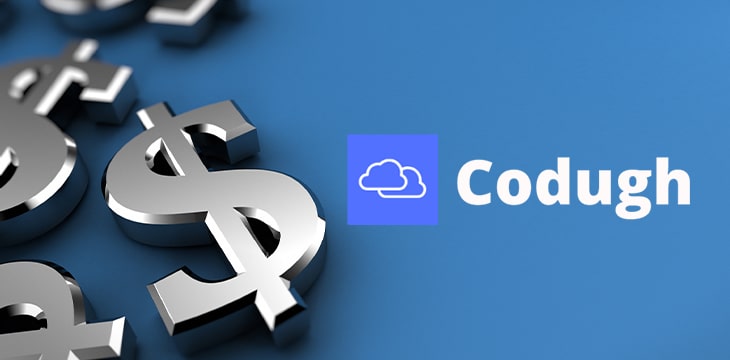|
Getting your Trinity Audio player ready...
|
Codugh, the platform that pays developers real-time micropayments for the use of their code, has developed its own version of stablecoin to deal with price volatility issues. “Codugh USD,” or CUSD, is a tokenized asset on the BSV blockchain designed especially for tiny payments. It maintains a steady value of one-hundredth of a U.S. cent ($0.0001) to give Codugh’s users more price security.
Fiat micropayments are live! 💰💵https://t.co/A0cK69buGl
— Codugh (@Codugh) August 11, 2022
The company also announced it would expand the number of digital assets it supports for balances. Previously a BSV-only app, it will now include BTC, ETH, Litecoin (LTC), Stellar Lumens (XLM), Axie Infinity (AXS), and Tether (USDT).
In a blog post explaining CUSD’s purpose, Codugh said there was a need for a more price-stable way to deliver micropayments, giving users “an entirely fiat native experience whilst still using blockchain under-the-hood.”
Codugh developed CUSD to tackle one of blockchain’s biggest adoption problems: price volatility. The world has near-infinite uses for a fast, secure digital micropayments network, but potential users are often turned off by wild value fluctuations, which impact income and savings. This is a symptom of the industry’s past focus on asset price speculation and trading, rather than working to build practical applications.
For those actually developing practical applications, like Codugh, there’s a need to find creative solutions to this problem. The blog post says:
“CUSD allows for the same low-cost instant microtransactions that crypto allows, whilst being immune to the price volatility. Users of CUSD need not understand crypto or deal with it directly, all they see when moving money around is US Dollars.”
CUSD in Codugh’s product suite and possibly third-party projects
Speaking to CoinGeek, Codugh co-founder Shashank Singhal said he hoped CUSD “will address the biggest of our current problems and allow us to grow more aggressively.”
CUSD itself is a native BSV token running on the STAS protocol. It allows Codugh to price all its API services in USD and its users to hold USD-value balances. CUSD can only currently be used within the Codugh platform, and users can select their preferred digital assets to withdraw to external wallets.
Codugh has invited other projects to use CUSD in their own products and is looking to expand the micropayment fiat token into other areas of its product suite.
Singhal said the company is exploring a variety of solutions across several different microtransaction use cases. This could hopefully include a microtransaction payment processor, cloud storage, compute services, and IoT-centric solutions.
While other stablecoins already exist, they are denominated in whole cents, making them impractical on platforms like Codugh’s. The system works by sending micropayments to developers every time their code is used in other applications. Unlike other code libraries and API marketplaces, it needs to make those payments in real-time. This is so developers (who often write their code part-time or between other jobs) don’t have to wait weeks/months for fiat currency payment methods to accrue enough value to make the transaction worthwhile.
Maintaining CUSD’s micro-dollar value
The current version of CUSD is more “stablecoin-like” than a true stablecoin of the type we’re used to seeing in the blockchain. Issues common to all such assets include the need to maintain a price peg and the method of doing so.
Singhal said Codugh’s BSV reserves currently support CUSD’s $0.0001 peg and note that the company has “significant BSV reserves ready to deploy in the event of significant price fluctuations.” However, the peg would need to be more formalized if it becomes more widely used.
“We intend to move towards proper fiat reserves in the coming months. Currently, CUSD can only be used within the Codugh platform to consume our products and services. Until we have fiat reserves up and running and we have proper plans in place concerning verification of the fiat peg, we will not allow CUSD to be transferred outside of the Codugh platform. Our BSV reserves go far beyond what we expect our users to hold in CUSD for the near future.”
One of the BSV blockchain’s greatest strengths is its ability to process fast micro and even nano-payments at a price that makes such payments realistic. This is impossible on fiat payment networks without payment bundling, and high fees on other blockchain networks like BTC make on-chain micropayments equally difficult.
CUSD intends to combine this strength with more recognizable (and stable) dollar values by also harnessing BSV’s tokenized asset capabilities. BSV is creating whole new economic models for the digital age with billions of micropayments. Systems such as Codugh’s help bridge the gaps in experience and blockchain knowledge for users while offering an extra layer of price security.
Watch: The BSV Global Blockchain Convention panel, Small Payments, Big Fun: Micropayments for Casual Games
https://www.youtube.com/watch?v=3Nfi_QF8wU0

 12-13-2025
12-13-2025 





